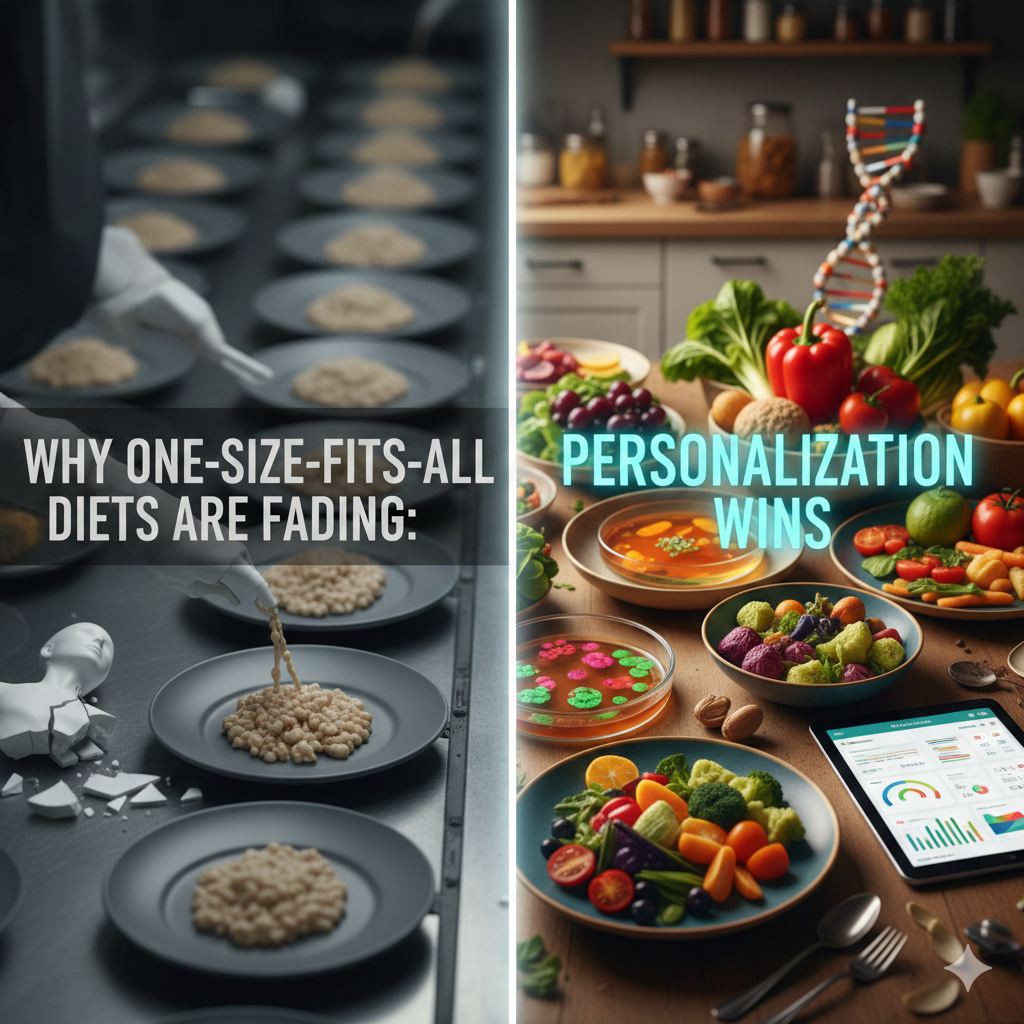Over time, you may have noticed that one-size-fits-all diets are becoming less effective for people seeking sustainable health and wellness. Instead, personalized approaches to nutrition, tailored to your unique body, lifestyle, and preferences, are emerging as the favored solution. By considering factors like your metabolism, genetic predispositions, and personal goals, you can avoid the pitfalls of generalized dieting that often lead to frustration and failure. Embracing a customized nutrition plan not only enhances your results but also makes the journey enjoyable and sustainable.
Key Takeaways:
- Personalization in diets caters to individual health needs, preferences, and biological responses.
- Advancements in technology and data analysis enhance the ability to create tailored nutrition plans.
- One-size-fits-all approaches overlook genetic diversity and lifestyle variations among individuals.
The Limitations of One-Size-Fits-All Diets
Historical Context of One-Size-Fits-All Diets
Historically, diets like low-fat or low-carb dominated nutritional advice based on the prevailing understanding of health. These simplistic guidelines often neglected the complexities of human physiology, assuming that uniform solutions could yield weight loss or health benefits. Cultural trends and marketing frequently reinforced these one-size-fits-all approaches, resulting in widespread adherence despite their shortcomings.
The Science Behind Individual Nutritional Needs
Your body is unique, influenced by genetics, lifestyle, age, and health status. Recent research indicates that factors such as metabolic rates and nutrient absorption can vary significantly among individuals, rendering standardized dietary guidelines ineffective. Personalized nutrition takes into account these differences, tailoring dietary recommendations to better suit your specific needs.
Studies show that personalized diets can lead to more effective outcomes. For example, a 2020 study published in the journal “Cell Metabolism” found that participants responding to tailored dietary interventions experienced greater weight loss and improved metabolic markers compared to those on generic diets. This personalization may include macronutrient ratios, food preferences, and individual goals, ensuring that you achieve sustainable dietary success.
The Rise in Dietary Diversity
The shift towards dietary diversity is becoming increasingly evident as consumers seek individualized health solutions. Interest in various dietary approaches, from plant-based to ketogenic diets, highlights the importance of accommodating different biological and lifestyle needs. This trend reflects a growing awareness that no single diet can cater to everyone’s requirements.
This rising dietary diversity is powered by innovative food trends and increased access to nutritional information. You can now find countless diets that cater to specific health conditions, ethical beliefs, and personal preferences. For instance, research on the Mediterranean diet demonstrates its benefits for heart health, yet considerable flexibility allows you to modify it according to your tastes and nutritional needs, showcasing the broader movement towards personalized nutrition over rigid, uniform plans.

The Role of Personalization in Nutrition
Understanding Genetic Influences on Diet
Your genetic makeup significantly influences how your body responds to different nutrients, affecting metabolism and health outcomes. Studies have shown that variations in genes can dictate your ideal macronutrient ratios and predispose you to certain diet-related conditions, such as diabetes or obesity. By understanding your unique genetic profile, you can tailor your nutrition to enhance your well-being and optimize performance.
The Impact of Lifestyle and Activity Levels
Your daily habits, including activity levels and work routines, play a critical role in determining your dietary needs. Individuals with more active lifestyles require more calories and nutrients than those with sedentary habits. Tailoring your diet based on activity can significantly enhance energy levels and overall health.
Athletes, for example, often have higher protein and carbohydrate needs compared to someone who has a desk job. Additionally, not just the intensity, but the type of activity, such as strength training versus endurance exercise, will influence your macronutrient distribution. Adapting your meal choices based on your lifestyle allows you to better fuel your body for optimal performance and recovery.
Psychological Factors and Food Choices
- emotional triggers
- stress levels
- cultural influences
Recognizing emotional eating patterns can enable you to address underlying issues rather than simply responding to cravings. For instance, leveraging mindful eating techniques helps you reconnect to your body’s hunger signals and dietary preferences, promoting healthier choices. The more you understand these psychological factors, the better you can navigate your relationship with food.
- mindful eating
- hunger signals
- healthier choices

Technology and Personalized Nutrition
Nutrigenomics: The Intersection of Diet and Genetics
Nutrigenomics explores how your genes influence your nutritional needs. By understanding genetic variations, you can tailor your diet to optimize health outcomes. For instance, a specific genotype may predispose you to certain nutrient deficiencies, enabling a proactive approach to dietary changes. Personalized nutrition based on genetic insights is becoming a game-changer in how you manage your health.
Wearable Tech and Food Tracking Apps
Wearable technology and food tracking apps empower you to monitor your dietary habits effectively. These tools collect data on your activity levels and eating patterns, allowing for real-time adjustments to your nutrition. With features like barcode scanning and meal suggestions, they simplify the journey toward your personalized diet.
Many apps now integrate machine learning algorithms to analyze your food intake and exercise routines, offering tailored recommendations based on your preferences and health goals. This level of personalization helps you make informed decisions about what and when to eat, streamlining your path to better health outcomes.
The Future of Artificial Intelligence in Dietary Recommendations
Artificial Intelligence is poised to revolutionize how dietary recommendations are made, using vast datasets to deliver individualized nutrition plans. Imagine AI analyzing your health data, lifestyle choices, and even preferences to suggest meals tailored specifically for you.
Emerging AI systems not only crunch data from various sources but also continuously learn from your feedback. As these technologies evolve, they will enable increasingly sophisticated dietary guidance, adapting in real-time to support your unique health journey. As noted in No More One-Size-Fits-All Diets: How Precision Nutrition …, the potential for personalized nutrition is vast and exciting.

Success Stories: Personalized Diets in Action
Case Studies of Successful Dietary Changes
Numerous individuals have embraced personalized diets with remarkable results, showcasing the effectiveness of tailored nutritional plans.
- Sarah: Transitioned to a low-carb diet based on her genetic profile, losing 25 pounds in 3 months.
- Mark: Adopted a plant-based approach due to his microbiome analysis, improving his cholesterol levels by 30%.
- Emily: Customized her meals for gluten sensitivity, resulting in increased energy and a weight loss of 15 pounds in 8 weeks.
- Tom: Implemented a high-protein diet after metabolic testing, achieving a muscle gain of 10 pounds while shedding 5% body fat.
Testimonials from Individuals on Personalized Plans
Individuals who have pursued personalized nutrition often share transformative experiences that highlight the tangible benefits of tailored diets. For instance, many report enhanced energy levels, improved mood, and significant weight loss, illustrating that these individualized strategies lead to success that is hard to achieve with generic diets.
How Personalized Approaches Yield Better Results
Personalized approaches to nutrition leverage your unique genetic makeup, lifestyle, and preferences, leading to sustainable health improvements. Scientific studies indicate that individuals following tailored diets are more likely to adhere to their plans and experience long-term success, as these methods align better with their specific needs compared to one-size-fits-all diets.

The Importance of Professional Guidance
Role of Nutritionists and Dietitians
Working with a nutritionist or dietitian can significantly enhance your dietary journey. These professionals assess your personal health needs, preferences, and lifestyle, providing expert guidance that generic diets cannot offer. Their knowledge helps tailor a nutrition plan that aligns with your unique goals, ensuring sustainable changes rather than quick fixes.
The Value of Tailored Meal Plans
Tailored meal plans take individual preferences and requirements into account, promoting long-term adherence and success. Instead of relying on a one-size-fits-all approach, customized plans allow you to enjoy foods you love while supporting your specific health goals.
For instance, if you have a food intolerance or specific fitness goals, a tailored meal plan can accommodate those factors while providing necessary nutrients. Studies show that individuals who follow personalized meal strategies often experience better outcomes, including improved energy levels, weight management, and overall well-being. These plans are not just about calories; they focus on whole food choices and combinations that work best for you.
Integrating Personalization with Medical Nutrition Therapy
Integrating personalization with Medical Nutrition Therapy (MNT) elevates your dietary experience. MNT involves a thorough assessment of medical conditions, which enables a dietitian to customize nutrition strategies that enhance health outcomes and mitigate disease risks.
This integration often utilizes evidence-based approaches to address specific health issues, such as diabetes or hypertension. By combining individualized nutrition guidance with MNT, you’re not just eating; you’re actively participating in managing your health. You can expect outcomes like better blood sugar control, improved lipid profiles, and enhanced overall health, tailored to your personal medical history and goals.
Challenges and Considerations
Barriers to Accessing Personalized Nutrition
Accessing personalized nutrition can be hindered by various factors, such as cost, availability, and lack of education. Many people face economic constraints that prevent them from affording personalized dietary plans or genetic testing. Additionally, the need for expertise in navigating personalized nutrition can create a knowledge gap, making it challenging for you to implement effective changes in your diet.
Misconceptions About Tailored Diets
You may encounter the misconception that tailored diets are only for the elite or those with specific medical conditions. This perception creates a barrier, as many assume personal nutrition is unnecessary for the average individual. However, personalized diets can benefit anyone striving for improved health and wellness, not just those with unique dietary needs.
Consider the widespread belief that tailored diets are overly complicated and difficult to maintain. In reality, personalized nutrition can be both simple and adaptable, focusing on your preferences and lifestyle. It’s imperative to recognize that the effectiveness of these diets stems from their flexibility and ability to evolve with your individual needs, rather than imposing strict and unrealistic restrictions.
Ensuring Sustainability in Personalized Diet Plans
Sustainability is a vital consideration in personalized diet plans. Implementing changes that are not only actionable but also fitting for your long-term lifestyle is imperative. You need to ensure that the foods you include are accessible and that your new habits can be maintained without extreme effort.
Exploring sustainable options can greatly enhance your personalized diet. By emphasizing locally sourced ingredients and seasonal produce, you can support not just your health but also the environment. Additionally, adopting meal planning techniques will help you minimize waste while ensuring that your meals remain diverse and satisfying, fostering adherence to your personalized nutrition plan over time.
Final Words
Conclusively, the shift from one-size-fits-all diets to personalized nutrition reflects a deeper understanding of individual needs and preferences. As you recognize that your body reacts differently to various foods, it becomes clear that tailored diets can enhance your health outcomes and overall well-being. You benefit from customized plans that consider your unique genetic, metabolic, and lifestyle factors, ultimately leading to more sustainable and effective results. Embracing this personalized approach empowers you to take control of your health journey.
FAQ
Q: What is the primary reason one-size-fits-all diets are becoming less popular?
A: One-size-fits-all diets are fading because individuals have unique metabolic rates, genetics, and lifestyle factors that affect their nutritional needs. Personalization addresses these differences, leading to more effective and sustainable weight management solutions.
Q: How does personalized nutrition improve dietary adherence?
A: Personalized nutrition takes into account an individual’s taste preferences, cultural background, and specific health goals, making it easier for people to stick to their dietary plans. This tailored approach fosters greater satisfaction and commitment to long-term lifestyle changes.
Q: What role does technology play in personalized diets?
A: Technology, such as mobile apps and genetic testing, enables individuals to track their food intake, analyze nutrient needs, and receive customized meal plans. This integration of technology provides data-driven insights that enhance the effectiveness of personalized diets.
Q: Can personalized diets help with specific health conditions?
A: Yes, personalized diets can be designed to address specific health conditions, such as diabetes, hypertension, or food intolerances. By tailoring nutritional recommendations, individuals can manage their health issues more effectively and improve their overall well-being.
Q: What are the benefits of consulting a nutrition professional for personalized dieting?
A: Consulting a nutrition professional can provide expert guidance on creating a personalized diet based on individual health assessments, dietary preferences, and goals. Professionals can also offer ongoing support and adjustments to ensure the diet remains effective and aligned with changing needs.










